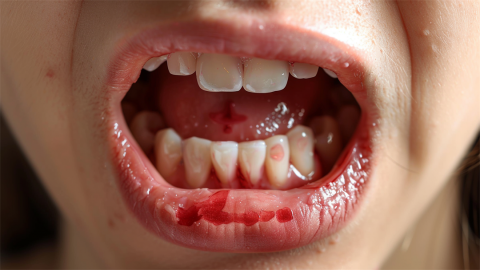What can excessive bleeding of the gums lead to?
Generally, excessive gum bleeding may lead to anemia, worsening of oral infections, destruction of periodontal tissues, tooth loosening and loss, as well as negatively affect eating ability and quality of life. The details are as follows:

1. Anemia: Prolonged or sudden heavy bleeding from the gums can reduce the total blood volume in the body. If blood loss exceeds the body's rate of blood production, iron-deficiency anemia may easily develop. Patients may experience symptoms such as dizziness, fatigue, pale complexion, and palpitations, which can impair normal physiological functions. This condition requires improvement through iron supplementation and dietary adjustments.
2. Worsening of oral infection: Bleeding gums create open wounds, allowing oral bacteria to invade deeper tissues more easily, leading to the spread of infection and exacerbation of gingivitis, potentially progressing to periodontitis. Infections may also cause increased gum swelling, pain, and pus formation, further compromising oral health.
3. Periodontal tissue destruction: Gum bleeding is often associated with periodontal inflammation. Persistent bleeding allows chronic inflammation to progressively damage periodontal ligaments, alveolar bone, and other supporting tissues, resulting in deepening of periodontal pockets and resorption of alveolar bone. As these periodontal structures provide essential support for teeth, their deterioration compromises dental stability.
4. Tooth loosening and loss: As periodontal tissues continue to deteriorate and alveolar bone resorption worsens, the supporting structures of teeth gradually weaken, leading to noticeable tooth mobility. Without timely intervention, the degree of looseness increases over time, eventually resulting in tooth loss. This affects normal chewing function and may even alter facial appearance.
5. Impact on eating and quality of life: When gums bleed, chewing food may irritate the wound, causing pain or increased bleeding. Patients may unconsciously avoid using the affected side for chewing, which over time can result in uneven masticatory function. Additionally, problems such as bad breath and impaired dental aesthetics may arise.
It is recommended to maintain daily oral hygiene by brushing teeth twice a day with a soft-bristled toothbrush, using dental floss to clean interdental spaces, and undergoing regular periodontal examinations and professional cleanings. Including foods rich in vitamin C and iron—such as oranges, spinach, and lean meats—in the diet can help improve gum health and reduce bleeding episodes.




